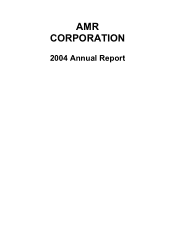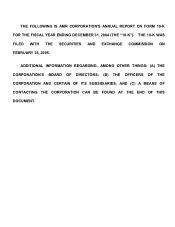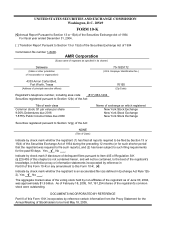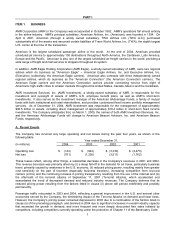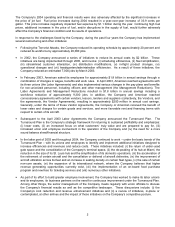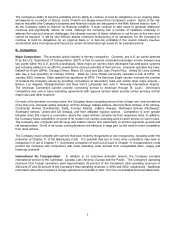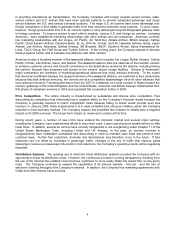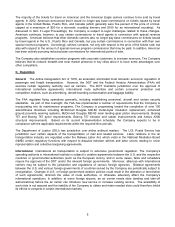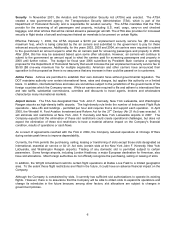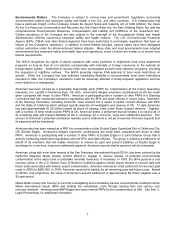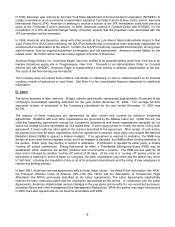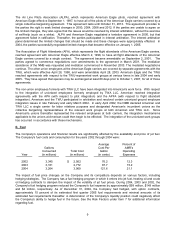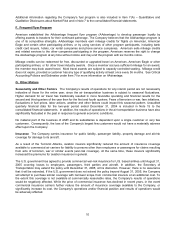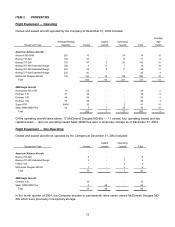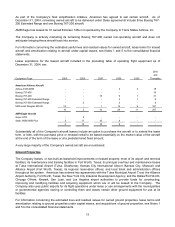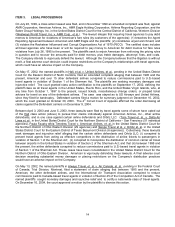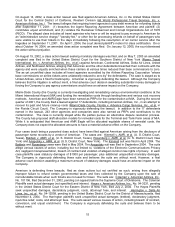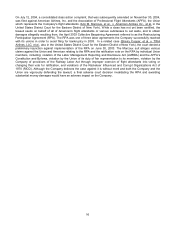American Airlines 2004 Annual Report Download - page 9
Download and view the complete annual report
Please find page 9 of the 2004 American Airlines annual report below. You can navigate through the pages in the report by either clicking on the pages listed below, or by using the keyword search tool below to find specific information within the annual report.6
Security In November 2001, the Aviation and Transportation Security Act (ATSA) was enacted. The ATSA
created a new government agency, the Transportation Security Administration (TSA), which is part of the
Department of Homeland Security and is responsible for aviation security. The ATSA mandates that the TSA
provide for the screening of all passengers and property, including U.S. mail, cargo, carry-on and checked
baggage, and other articles that will be carried aboard a passenger aircraft. The ATSA also provides for increased
security in flight decks of aircraft and requires federal air marshals to be present on certain flights.
Effective February 1, 2002, the ATSA imposed a $2.50 per enplanement security service fee ($5 one-way
maximum fee), which is being collected by the air carriers and submitted to the government to pay for these
enhanced security measures. Additionally, for the years 2002, 2003 and 2004, air carriers were required to submit
to the government an amount equal to what the air carriers paid for screening passengers and property in 2000.
After 2004, this fee may be assessed based upon some other allocation. However, air carriers will continue to
submit to the government an amount equal to what the carriers paid for screening passengers and property in
2000 until further notice. The budget for fiscal year 2006 submitted by President Bush contains a spending
proposal for the Department of Homeland Security that would increase the per enplanement security service fee to
$5.50 ($8 one-way maximum fee for multiple segments). American and other carriers have announced their
opposition to this proposal as there is no assurance that any increase in fees could be passed on to customers.
Airline Fares Airlines are permitted to establish their own domestic fares without governmental regulation. The
DOT maintains authority over certain international fares, rates and charges, but applies this authority on a limited
basis. In addition, international fares and rates are sometimes subject to the jurisdiction of the governments of the
foreign countries which the Company serves. While air carriers are required to file and adhere to international fare
and rate tariffs, substantial commissions, overrides and discounts to travel agents, brokers and wholesalers
characterize many international markets.
Airport Access The FAA has designated New York John F. Kennedy, New York LaGuardia, and Washington
Reagan airports as high-density traffic airports. The high-density rule limits the number of Instrument Flight Rule
operations - take-offs and landings - permitted per hour and requires that a slot support each operation. In April
2000, the Wendell H. Ford Aviation Investment and Reform Act for the 21st Century (Air 21 Act) was enacted. It
will eliminate slot restrictions at New York John F. Kennedy and New York LaGuardia airports in 2007. The
Company expects that the elimination of these slot restrictions could create operational challenges, but does not
expect the elimination of these slot restrictions to have a material adverse impact on the Company’s financial
condition, results of operations or cash flows.
As a result of agreements reached with the FAA in 2004, the Company reduced operations at Chicago O’Hare
during certain peak times to improve dependability.
Currently, the FAA permits the purchasing, selling, leasing or transferring of slots except those slots designated as
international, essential air service or Air 21 Act slots (certain slots at the New York John F. Kennedy, New York
LaGuardia, and Washington Reagan airports). Trading of any domestic slot is permitted subject to certain
parameters. Some foreign airports, including London Heathrow, a major European destination for American, also
have slot allocations. Most foreign authorities do not officially recognize the purchasing, selling or leasing of slots.
In addition, the Wright Amendment restricts certain flight operations at Dallas Love Field to a limited geographic
area. To the extent these flight restrictions are lifted in the future, it could have an adverse financial impact on the
Company.
Although the Company is constrained by slots, it currently has sufficient slot authorizations to operate its existing
flights. However, there is no assurance that the Company will be able to obtain slots to expand its operations and
change its schedules in the future because, among other factors, slot allocations are subject to changes in
government policies.

